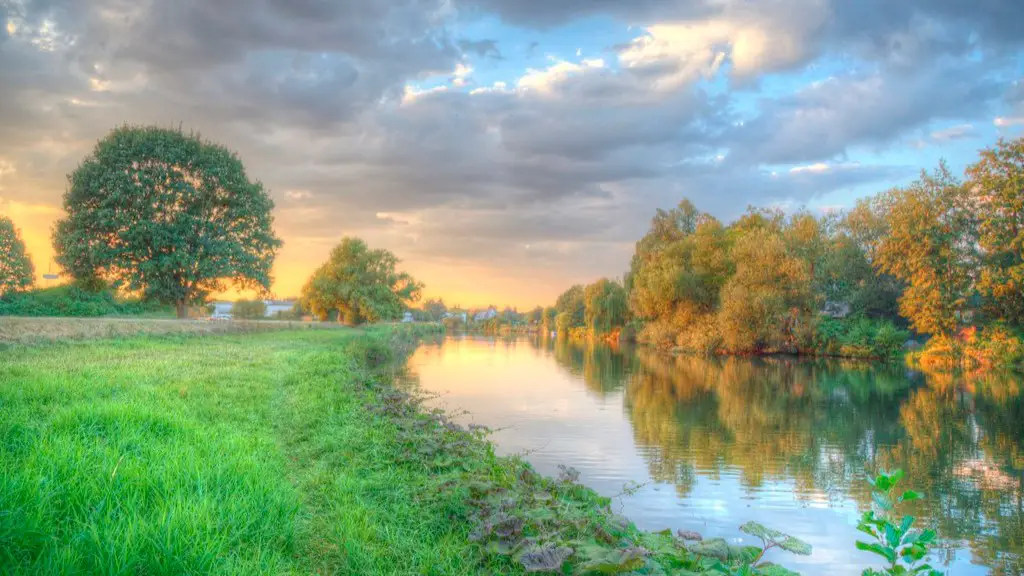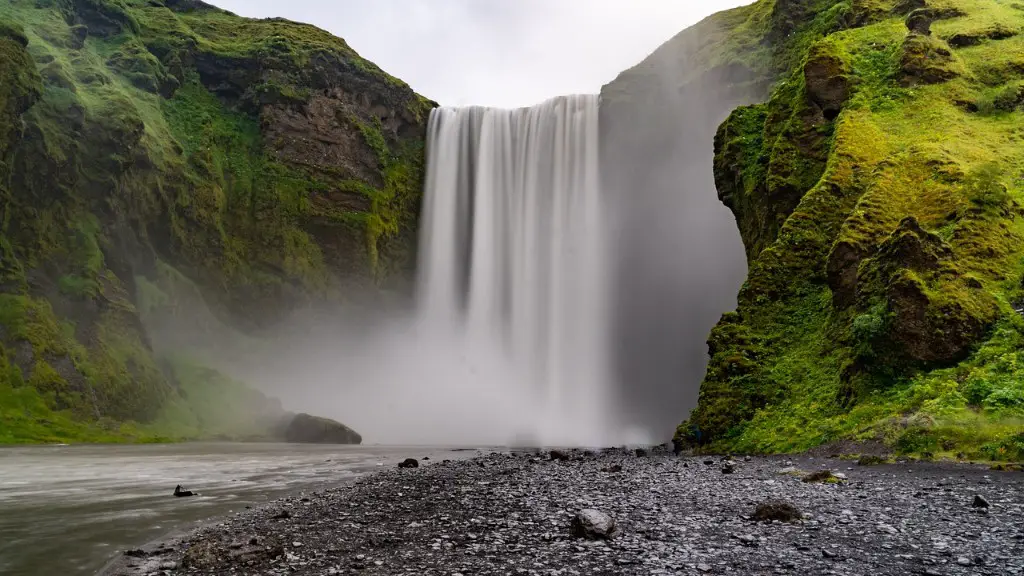The flow of the mighty Nile River was an important part of the religious landscape in Ancient Egypt. As the lifeline of the region, the Nile was an integral part of the Egyptian way of life, deeply intertwined with their gods. One of the most prominent deities was the god of the Nile, Hapi.
Hapi was an Old Kingdom deity and was depicted as a human with a large, ponderous belly and long, curly hair. He was flanked by two kalasirs, or goddesses, and crowned by a sacred crown and the uraeus, a reared cobra. In his hands, he held containers from which he would pour out the life-giving water of the Nile. Hapi was just one of many gods worshipped in Ancient Egypt, but his connection to the Nile made him one of the most powerful and vital gods.
According to ancient accounts, Hapi was believed to be responsible for the flooding of the Nile that occured each year in the summer. This was a crucial event for the people of Egypt, as the flooding waters would leave behind nutrient-rich silt which fertilized the land. This allowed the Egyptian farmers to grow their crops and feed their families. This prosperity and abundance was attributed to the fertility of Hapi.
Hapi was also responsible for looking after the people who lived on the banks of the river. He was a compassionate god, who protected them from floods and other natural disasters. He was also believed to have been a protector of sorts, providing wealth and abundance to his followers. Hapi was seen as a kind and generous figure, often depicted in representations of abundance and fertility.
The connection between the Nile River and Hapi was so integral to the Egyptian way of life that the Ancient Egyptians often included offerings of food, jewelry and other goods in their worship of the god. These offerings were meant to show the people’s reverence and gratitude to Hapi for all of the wealth and abundance he provided.
Although Hapi had a strong presence in Ancient Egyptian religion and mythology, he is largely forgotten today. Although there is still much to be discovered about this mysterious god, it is clear that his role as the god of the Nile River was essential to the success of the Ancient Egyptians.
Egyptian Pantheon
The Ancient Egyptians believed in a vast pantheon of gods, each with their own domain and power. The gods, or ‘netjeru’, were seen as the creators and protectors of the natural world. They were responsible for every aspect of life, from the sun and sky, to the rivers, crops, and fertility.
Hapi was just one of the many gods worshipped in Ancient Egypt. He was part of the larger Ennead, an extended family of nine Egyptian gods associated with the Creation of the world. This group of gods included Atum, the god of creation, and Geb, the earth god. The Ennead was thought to represent the nine essential attributes of Osiris, the god of death and rebirth, and the king of the Egyptian underworld.
Hapi was also associated with some of the other gods in the Egyptian pantheon. He was often paired with Shu, the god of air and his female counterpart, Tefnut, the goddess of moisture. In some accounts, Shu and Hapi were portrayed as two sides of the same god. In Ancient Egypt, it was believed that Shu represented the wind and the heat of the sun, while Hapi represented the cool and life-bringing waters of the Nile.
Hapi was also believed to be the son of Osiris and Isis, and was sometimes referred to as the ‘Son of the Nile’. He was seen as a manifestation of the fertility and abundance provided by the Nile River, and was often invoked in prayers and offerings. The god Hapi was essential to Ancient Egyptian life and religion, and it is no wonder that he is still remembered today.
Mythology and Egyptian Society
In Ancient Egyptian mythology, the gods were deeply intertwined with the society, culture and economy of the people. The annual flooding of the Nile was so vital to the survival of the Ancient Egyptians that they often thought of it as the life-giving breath of the gods. This is why the god of the Nile, Hapi, was so important in their mythology.
In Ancient Egyptian society, the gods were not seen as the distant omnipotent beings of modern religions, but rather as integral players in the lives of the Egyptian people. The gods were seen as human-like, with emotions and desires, and expected behavior from their followers. This was especially true of Hapi, as he was responsible for providing the abundance of food, water and wealth that were needed for daily life to flourish.
Although Hapi was generally seen as a benevolent god, he was also feared by the Egyptians because of his power to cause the flooding of the Nile. If the waters were too high or too low, it could be catastrophic for the people and their crops. This is why offerings and prayers were made to Hapi to keep the waters at a manageable level.
As the god of the Nile, Hapi was a powerful figure in Ancient Egypt and his influence was felt throughout the region. He was not only seen as a god of abundance and fertility, but also as a protective figure who looked after the people living on the banks of the river.
Hapi in Modern Times
Today the influence of Hapi can still be seen in modern Egypt. Although the god is mostly forgotten by the wider world, he is still remembered by the people of Egypt who continue to offer up prayers and make offerings to the river. In recent years, the river has been polluted due to industrialization and overpopulation, and the people of Egypt continue to revere Hapi in hopes of restoring the health of the Nile.
Hapi is also still invoked in modern religion and literature. In some circles, he is still seen as a benevolent god of abundance and fertility, and is sometimes worshipped as such. In addition, his popularity in modern culture has been given a boost by movies and television shows such as The Mummy and Stargate, which feature characters associated with Hapi and the Egyptian pantheon.
Although the god of the Nile is a figure long forgotten in the wider world, his influence and importance in Ancient Egypt cannot be denied. As the source of life and abundance for the people of the region, Hapi was a powerful figure who was deeply intertwined with the religious and cultural fabric of the Ancient Egyptians.
Legacy and Influence of Hapi
The legacy of Hapi is difficult to overstate. He was one of the most important gods in the Egyptian pantheon, and his importance and influence were felt throughout the region. He was a symbol of abundance and fertility, and was revered for his protection of the people of the Nile. Hapi’s influence was felt in beliefs, rituals, art and literature, and his legacy is still visible today.
Hapi was a god of abundance and prosperity, but he was also a god of protection. He was seen as a guardian of the people of the Nile, providing them with all the necessary resources to survive and prosper. He was invoked in prayers and offerings, and his role in the Ancient Egyptians’ lives was a crucial one.
The legacy of Hapi can still be seen in the modern world. He is still invoked in some circles and his influence is still visible in art, literature and popular culture. Although he is a figure mostly forgotten by the wider world, Hapi was an essential deity in Ancient Egypt, and his presence is still felt throughout the region.
Modern Relevance of Hapi
Hapi is a largely forgotten figure in modern times, but his influence still lingers in Egyptian culture and beliefs. In the modern world, Hapi is still invoked in prayers, sacrifices and offerings by the people of the Nile. The annual flooding of the river is still seen as a cause for celebration, and the people of Egypt still rely on the river’s life-giving waters for their survival.
Hapi is also seen as a powerful figure in literature and art. He is often invoked in stories, poems, and other forms of creative expression, typically as a figure of abundance, fertility, and protection. In recent years, his popularity has been given a boost by movies and television shows such as The Mummy and Stargate, which feature characters associated with the Ancient Egyptian pantheon.
The legacy of Hapi may have been largely forgotten by the wider world, but in Egypt, his importance is still remembered and celebrated. He was an essential god in the Ancient Egyptians’ worldview, and his influence can still be seen in the modern world.





